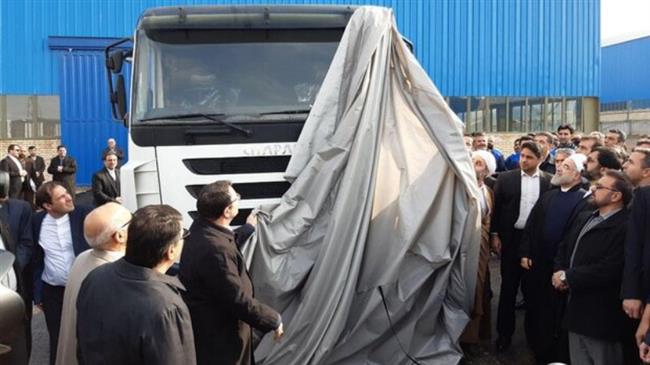Thursday 2 January 2020 - 14:57
Story Code : 367002
Iran opens truck production plant after Germans leave
The first phase of the plant for production of Chapar (Carrier) trucks came online during a ceremony attended by President Hassan Rouhani in Meshginshahr in northwest Iran.
The plant will manufacture�50 trucks a day at full production. It�is currently operating with 400 workers, but another 800 people will be employed in the first phase which has been�built at a cost of $240 million.
"This massive automotive project is predicted to be finalized and launched in the next four years, in which case�5,000 people will be working in the production unit," Tasnim news agency said.
Chapar is powered by a 354 horsepower diesel�engine, with torque of 1,850 Newton meters. Media reports said the truck�has been�produced with the help of Germany's Mercedes-Benz�and that many of its parts are identical to original parts.
Mercedes-Benz is part of German car and truck manufacturer Daimler which dropped plans to expand its Iran business in reaction to renewed US sanctions in August 2018.
The company had established a joint venture with Iranian vehicle manufacturer and dealer Iran Khodro and Iran�s Mammut Group to make and distribute Mercedes-Benz trucks and powertrain components in the country.
Furthermore, there were plans for Daimler to return as a shareholder in the former engine joint venture Iranian Diesel Engine Manufacturing Co. (IDEM) in Tabriz.
Iran, a country of more than 80 million people, has a huge demand for automobiles. According to Ministry of Industry, Mine and Trade, Iran produced more than 1.5 million cars in 2017.
The new US sanctions have seriously disrupted the car market, causing prices to shoot through the roof as factories have failed to provide cars on time.
Daimler joined France's Renault and its competitor Peugeot-Citro�n to put their development in Iran on hold after new US sanctions went into effect.
Iran�s Minister of Industry, Mine and Trade Reza Rahmani said then Renault and Peugeot would never be allowed to return to the Iranian market given their repeated failures to honor their commitments.
Last month, Rahmani touched on 20,000 unfinished cars gathering dust at the parking lots of Iran�s leading auto manufacturers because parts needed in their production could not be imported due to the sanctions.
�With the help of the defense industry and the private sector, we supplied most of the parts internally and completed and delivered about 10,000 vehicles,� said the minister.
The first agreement between Iran's defense ministry and the country's car manufacturers was signed six months ago to build hi-tech auto parts which Iran used to import.
Cars produced in Iran under license from foreign manufacturers rely on critical imports of parts ranging from airbags, pistons and cylinder heads to computer chips including engine control units and sensors.
Iran�s auto industry has emerged as one of the frontlines in a raging �economic war� on the country which is lining up its defense ministry to protect the sector from US sanctions.
The automotive sector is the second largest industry after oil and gas and with a turnover of about $12 billion, it plays an important role within Iran�s economy, making up for 10 percent of the country�s GDP and 4 percent of its workforce.
Moreover, it supports about 60 other industries, such as glassmaking, aluminum, copper, steel, rubber, textiles and paint.
When the Trump administration reimposed sanctions on Iran in August 2018, it reserved Washington�s first hammer blow for the car industry to hurt as many Iranians as possible.
More than 100,000 people are employed by the two largest local manufacturers Iran Khodro (IKCO) and Saipa, while another 700,000 Iranians work in industries related to car manufacturing.
There are around 13 public and private auto manufacturers in Iran, with IKCO and Saipa accounting for about 94% of the domestic production.
# Tags











